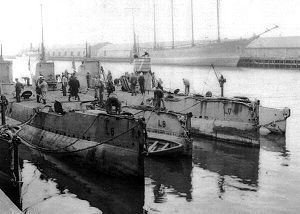.gif)
USS L-6 (SS-45)
Encyclopedia
USS L-6 (SS-45) was an L-class submarine
United States L class submarine
The United States L class submarine was the United States Navy's first attempt at designing and building ocean-going submarines, which at the time was a yawning gap in capability compared with other major navies...
of the United States Navy
United States Navy
The United States Navy is the naval warfare service branch of the United States Armed Forces and one of the seven uniformed services of the United States. The U.S. Navy is the largest in the world; its battle fleet tonnage is greater than that of the next 13 largest navies combined. The U.S...
. Her keel was laid down on 27 May 1914 by Craig Shipbuilding Company in Long Beach, California
Long Beach, California
Long Beach is a city situated in Los Angeles County in Southern California, on the Pacific coast of the United States. The city is the 36th-largest city in the nation and the seventh-largest in California. As of 2010, its population was 462,257...
.
The L-boats designed by Lake Torpedo Boat
Lake Torpedo Boat
The Lake Torpedo Boat Company of Bridgeport, Connecticut was an early maker of submarines for the U.S. Navy. Founded by Simon Lake in 1912, the firm competed with John Philip Holland's Electric Boat Company until financial difficulties led to the company's demise in 1924.-External links:**...
(L-5 through L-8) were built to slightly different specifications from the other L-boats, which were designed by Electric Boat
Electric boat
While a significant majority of water vessels are powered by diesel engines, with sail power and gasoline engines also remaining popular, boats powered by electricity have been used for over 120 years. Electric boats were very popular from the 1880s until the 1920s, when the internal combustion...
, and are sometimes considered a separate L-5 class.
L-6 was launched
Ship naming and launching
The ceremonies involved in naming and launching naval ships are based in traditions thousands of years old.-Methods of launch:There are three principal methods of conveying a new ship from building site to water, only two of which are called "launching." The oldest, most familiar, and most widely...
on 31 August 1916 sponsored by Mrs. William R. Monroe, and commissioned
Ship commissioning
Ship commissioning is the act or ceremony of placing a ship in active service, and may be regarded as a particular application of the general concepts and practices of project commissioning. The term is most commonly applied to the placing of a warship in active duty with its country's military...
on 7 December 1917 with Lieutenant H. B. Berry in command.
Service history

Charleston, South Carolina
Charleston is the second largest city in the U.S. state of South Carolina. It was made the county seat of Charleston County in 1901 when Charleston County was founded. The city's original name was Charles Towne in 1670, and it moved to its present location from a location on the west bank of the...
, on 10 June. Following a brief overhaul, the submarine patrolled off Charleston until she sailed on 15 October for the eastern Atlantic. Arriving Ponta Delgada
Ponta Delgada
Ponta Delgada is a city and municipality on the island of São Miguel in the archipelago of the Azores, an autonomous region of Portugal. It includes 44,403 residents in the urban area, and approximately 20,113 inhabitants in the three central parishes that comprise the historical city: São Pedro,...
, Azores
Azores
The Archipelago of the Azores is composed of nine volcanic islands situated in the middle of the North Atlantic Ocean, and is located about west from Lisbon and about east from the east coast of North America. The islands, and their economic exclusion zone, form the Autonomous Region of the...
, in early November, L-6 joined Submarine Division 6 just prior to the signing of the Armistice with Germany
Armistice with Germany (Compiègne)
The armistice between the Allies and Germany was an agreement that ended the fighting in the First World War. It was signed in a railway carriage in Compiègne Forest on 11 November 1918 and marked a victory for the Allies and a complete defeat for Germany, although not technically a surrender...
on 11 November.
After making stops in Caribbean Sea
Caribbean Sea
The Caribbean Sea is a sea of the Atlantic Ocean located in the tropics of the Western hemisphere. It is bounded by Mexico and Central America to the west and southwest, to the north by the Greater Antilles, and to the east by the Lesser Antilles....
and Central America
Central America
Central America is the central geographic region of the Americas. It is the southernmost, isthmian portion of the North American continent, which connects with South America on the southeast. When considered part of the unified continental model, it is considered a subcontinent...
n ports, L-6 arrived San Pedro, California, on 14 February 1919, completing one of the best long-distance seagoing performances of the United States
United States
The United States of America is a federal constitutional republic comprising fifty states and a federal district...
's youthful submarine force. From 1919 to 1922, she remained on the West Coast, experimenting with new torpedo
Torpedo
The modern torpedo is a self-propelled missile weapon with an explosive warhead, launched above or below the water surface, propelled underwater towards a target, and designed to detonate either on contact with it or in proximity to it.The term torpedo was originally employed for...
es and undersea detection equipment. L-6 was placed in commission, in ordinary, on 24 March 1922; returned to full commission on 1 July; and sailed for the East Coast the same month. Upon arrival Hampton Roads
Hampton Roads
Hampton Roads is the name for both a body of water and the Norfolk–Virginia Beach metropolitan area which surrounds it in southeastern Virginia, United States...
, L-6 decommissioned on 25 November 1922, and was sold to M. Samuel and Sons on 21 December 1925 for scrapping.

